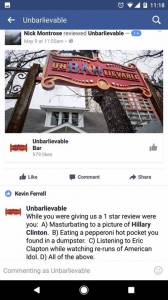- 25 Jul
Thoughts on Google My Business Website Builder
Google has now made their website builder available to all Google My Business users. I’ve taken some time to play around with it, and wanted to share my thoughts.
Before I start, let me share my biases, in case you don’t already know them.
I’ve been a user of WordPress since it’s blog only days, and have created more commercial websites in it than I care to remember. I’m a huge fan of its power, its flexibility and its openness.
I’m also not a fan of template driven site creation systems. Very rarely do they offer the customizability for my needs.
Unfortunately, Google My Business Website Builder doesn’t really do anything to change these biases.
First the good… It’s really easy to use. Setting up a “site” seemed intuitive, and I expect all but the most technically challenged business owner will be able to configure it.
It ties in nicely with one’s Google My Business listing. This shouldn’t be a big deal, but given Google’s lack of coordination across local marketing products, it’s a pleasant surprise.
Mike Blumenthal also points out that the product could be very helpful in the undeveloped world, where B2C hosting options are often limited. This could be very important to Google strategically over the long term.
And now the not so good…
The site cannot be customized for SEO purposes. This includes page tiles, meta descriptions, structured data markup, or image alt text. Ranking could be difficult.
No analytics, social sharing or real call to action buttons.
It’s a one page site. No sub-pages of any sort.
The only place I see this product being truly useful is for a “coming soon” type page. But, to be honest, that’s pretty easy to do with WordPress as well.
Read more... - 13 Jul
The Streisand Effect in England
Business owners, if you receive a negative review, the last thing you want to do is threaten to sue. Here’s an example of why:
High Rocks, a wedding-venue/restaurant in Kent, England, was not happy with a review they received from a customer, and threatened to sue the 44-year-old mother. They also informed her that she could be imprisoned if she did not submit to them the dates and receipts of when she ate there.
Now, I’m no legal scholar, especially of British law, but that doesn’t sound likely to me.
But dubious legal threats aside, this letter has done much more damage to High Rocks than any review in TripAdvisor might have done. Their threats, and other aggressive actions, have now received coverage in The DailyMail, Mirror, The Sun, The Independent, and Newser.
The Streisand Effect is when a powerful person or organization attempts to suppress a piece of information, and instead shines a huge spotlight on it.
Going legal against a review is going to do this. Just about every time.
Read more... - 29 Jun
How Not to Respond to Reviews
There’s a school of thought in local SEO that all reviews should be responded to. While that’s great in theory, it doesn’t always hold up in practice.
In many cases, the social media of a small company might be handled by the company’s owner. With all the things on the owner’s plate, it may not be possible to respond to each and every review.
Or, the owner may not be able to respond in a way that is helpful. For instance, a bar in Austin, Texas, Unbarlievable, has created quite the kerfuffle with their mysogynist, racist, and objectively crude responses to reviews.
While the reviews have since been deleted, a Facebook group has been created to maintain them in perpetuity.
Here’s an example of their fine responses:

Obviously, this is an extreme example, and whoever was responding to reviews for Unbarlievable (the owner, I would assume) seems to have some issues (IMHO), but it raises a valid point:
If you can’t respond to a negative review in a way that will make things better rather than worse, you’re better off not responding at all.
Read more... - 21 Jun
Basics of Securing WordPress
We here at ionadas local LLC absolutely love WordPress. It puts the power of managing a company website within the company, rather than having every little change made by a website design firm.
But WordPress is not without its challenges.
Most notable, perhaps, is security. The growing popularity of WordPress means more and more hackers are targeting sites that use it. And in it’s default configuration, WordPress definitely has some security vulnerabilities.
With that in mind (and having had to work on some hacked sites recently), I’d like to walk you through some of the ways you can harden WordPress against hackers.
Real Passwords
The biggest vulnerability is no fault of the WordPress system. Simple passwords will eventually be guessed.No, your daughter’s nickname plus four random characters is not a secure password. You need a truly random password that includes uppercase and lowercase characters, numbers, and symbols. I like to use a site like Password Generator to create them.
You need secure passwords for all WordPress logins as well as any FTP or cPanel accounts.
Then use a password manager to keep track of the passwords and to handle logins. There are countless of these for both desktop and mobile devices.
Keep Things Up to Date
WordPress, all plugins, and your theme need to be kept on their most recent versions. Vulnerabilities are discovered and patched regularly, so the older your install are, the more likely they are to have a security flaw.At least once per month, you should update everything on your site. If you read about a particular security vulnerability, you might want to update more often.
Sucuri
Sucuri is a free plugin that handles malware monitoring, security scanning, and incident detection. In other words, it lets you know what’s going on with your site and when hackers are attempting to do bad things to it.Install the plugin, sign up for the free API, and set the alerts to be sent to an email account you watch closely. I use a specific Gmail account for this. Anything that comes to that account needs to be looked at quickly (and closely).
WordFence
The last (for now) step you need to take is to install and configure WordFence, a WordPress firewall plugin. They offer a free version that hardens a site quite nicely.If you need an even more secure site, their premium version is only $8.25 per month.
These steps above will do a great deal to harden your site. While no site on the internet can ever be called perfectly secure, following this advice will make you a much less attractive target, and will likely result in hackers looking for easier pickings elsewhere.
And, if you need help setting any of this us, please give us a call at (512) 501-1875.
Read more... - 19 May
Interesting Facebook Ads Connection
After finishing up my lunch, I decided to peruse Facebook for pictures of my friends’ children and pets. To my surprise, the following ad came up in my feed:

I’ve not visited the Royal Caribbean website in at least five years. I’ve got a daughter still in single digits, so I only ever look at Disney Cruises.
I haven’t even searched a meta-travel site that might spark something like this.
What has happened is that my wife is looking at going on a Royal Caribbean cruise with her sisters and mother next year. Very recently looking at it, in fact, such as within the last week.
But, she did that from her own computer. She never uses mine.
I sometimes access her computer to provide IT support, but I never log onto Facebook there.
We’re connected on Facebook, she was almost certainly logged into Facebook when accessing the Royal Caribbean site, and we regularly both access Facebook from the same IP address (e.g. home).
It seems that Royal Caribbean was able to connect my wife’s browsing history to my Facebook interests for remarketing purposes. As it happens, it wasn’t well targeted (I’m not going on a cruise), but I can see how it might be. Advertising doesn’t bother me at all, as long as it’s reasonably well targeted.
But there are real privacy concerns to this. Any site I go to might trigger a Facebook cookie without my even knowing.
What if I’m searching for a birthday present? I might come up with the greatest idea for a present, something she would never think of, and have an ad for it appear in her Facebook stream.
Certainly there are more bothersome things that might pop up on a significant other’s Facebook feed.
Facebook might want to think through this one a bit more, but then, privacy has never seemed to be high on their priority list.
Read more...

Leave a Reply
You must be logged in to post a comment.